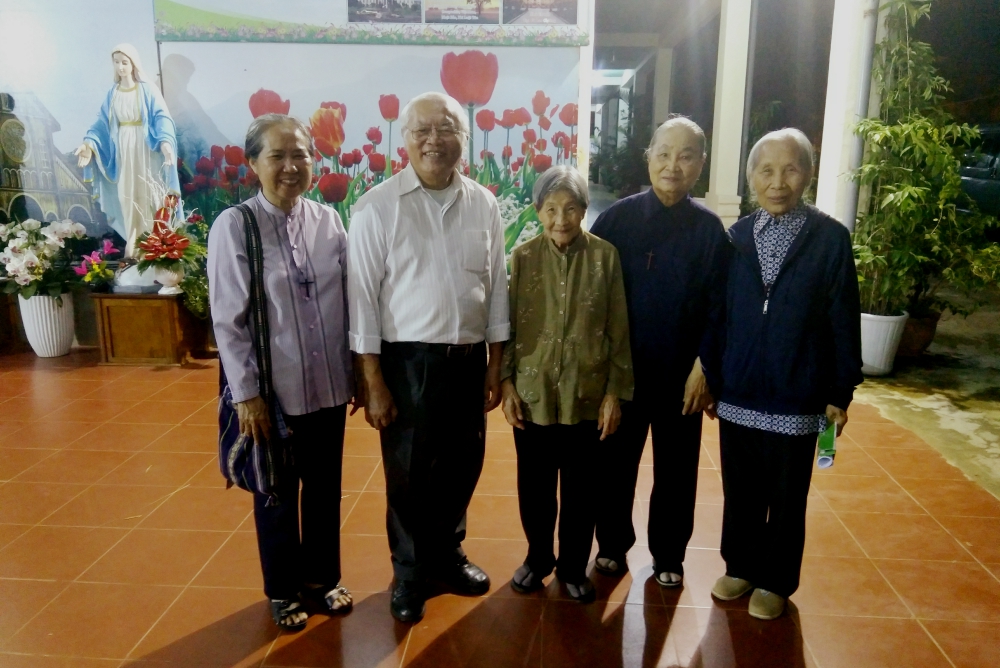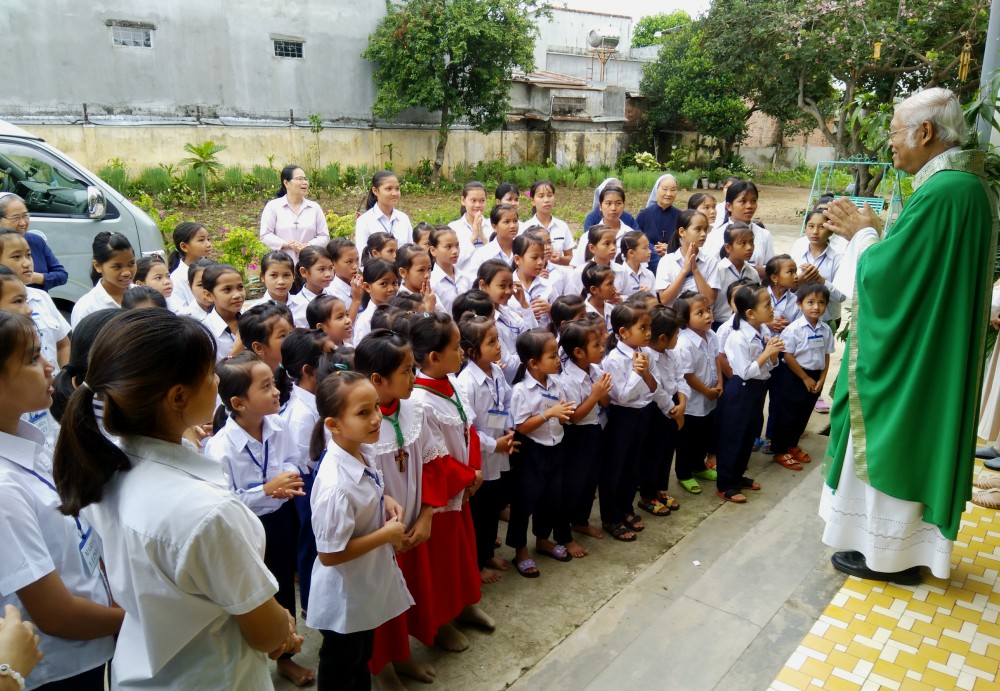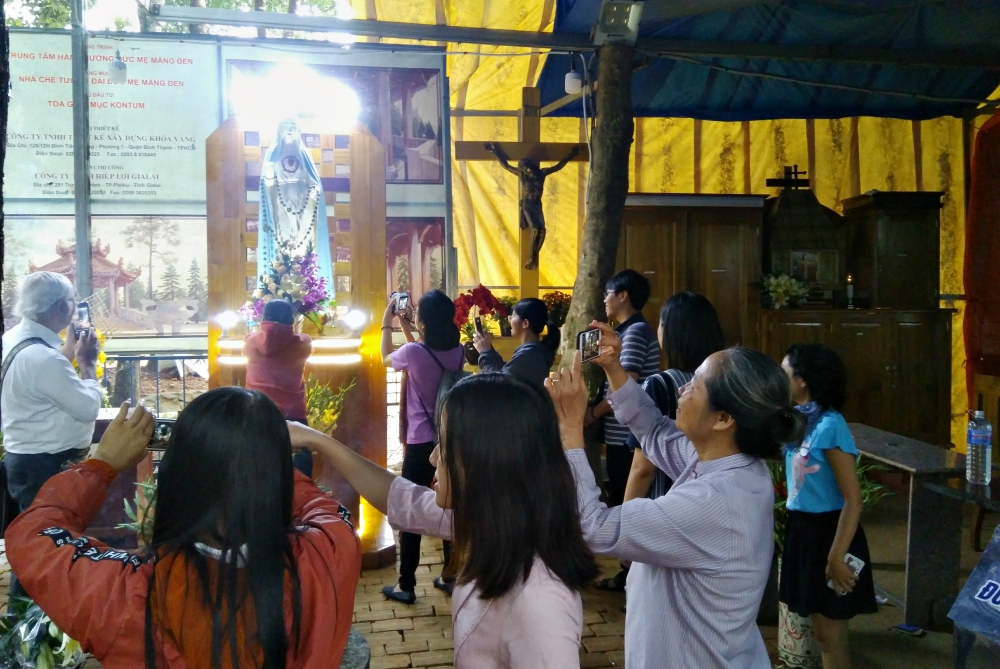
Jesuit Fr. Thomas Vu Quang Trung and Sisters of Providence of Tay Nguyen, Vietnam, pose for a photo at their convent. (Joachim Pham)
Jesuit Fr. Thomas Vu Quang Trung was the executive secretary of the Committee on Consecrated Life of the Catholic Bishops' Conference of Vietnam from 2010 to December 2019.
In that position, he dealt with issues of leadership, management and formation of all local congregations and cooperated with superiors to organize intensive and regular training courses, seminars, retreats, spiritual exercises and spiritual accompaniment for religious. He also helped congregations prepare and conduct their chapters and assemblies.
The committee also supports congregations with administrative procedures for their activities with the local church, the government and church organizations abroad.
As of September, the Catholic Church in Vietnam had 310 congregations, societies of apostolic life, secular institutes and associations, with 34,355 members working in 27 dioceses of the country, Trung said. Among them are 228 communities of women religious with 29,039 members, and the rest were of men religious.
Trung, 64, also served as episcopal vicar for religious in the Ho Chi Minh Archdiocese from 2007 to October 2019. The country's most active archdiocese is the base of motherhouses for 265 institutes, societies of apostolic life, secular institutes and associations, with 6,282 women religious and 1,585 men religious, Trung said.
Recently, Trung, former provincial superior of Jesuits' Vietnam Province and former president of the Conference of Major Superiors of Religious in Vietnam, talked with GSR about sisters' ministries and their challenges and status in the local church.
GSR: Please tell me about the sisters' contribution to education, health care and charity.
Trung: Most women's congregations actively partake in these activities. They run day care centers and nursery schools in cities and remote areas. Many of them offer free education to children from poor families. Some open elementary and high schools and vocational centers. Some sisters teach at public universities and colleges.
Sisters run charitable clinics, giving free medical treatment to patients. Many sisters from various orders have voluntarily served patients with HIV/AIDS in their final stages of life for 15 years at a state-run hospital in Binh Phuoc Province.
Sisters visit and offer health care to people at ethnic minority villages. They also provide accommodation and loving care for abandoned elderly people, lepers, orphans, pregnant women left by their boyfriends, and people with physical disabilities. Migrant workers seek pastoral care and material support from religious sisters.
Sisters also spend time in working at parishes and taking care of Catholic associations.

Jesuit Fr. Thomas Vu Quang Trung visits ethnic students at a hostel run by Sisters of Providence of Tay Nguyen in Kontum City, Vietnam. (Joachim Pham)
What problems do they face?
Religious organizations cannot establish public hospitals and schools except for nursery schools because they fail to meet the country's legal requirements. As a result, educational and health care facilities run by religions are seen as charities.
In remote and mountainous areas, sisters encounter difficulties and problems from local authorities while they visit and look after people in need. They are prevented from meeting and offering material support and pastoral care to ethnic villagers. Authorities refuse to allow them to live among the villages.
Are sisters involved in evangelization work abroad?
Many sisters are sent overseas to study theology, ministries and other majors. Many are also assigned to evangelize or do pastoral work in Asia, Europe, Africa, Australia and America. Sisters account for three-fourths of the total number of 2,361 Vietnamese religious studying and working abroad.
What attracts young women to religious vocations?
Despite living in an atheistic society, Vietnamese people hold religious dignitaries, monks and nuns in great respect. Religious vocations are seen as nobility and honor for families. Catholics long for their children to consecrate their lives to God.
Religious vocations are mostly from good families in rural areas. In cities, few people enter religious life because youths have various options for their future and many couples have only one or two children.
For the past 15 years, many foreign congregations have come to recruit and train young vocations. Many of them attract a lot of local vocations and establish communities in the country. Foreign religious and priests enter Vietnam as teachers and workers of companies or nongovernmental organizations. We help them follow legal procedures to get the approval of the local church and authorities.

Jesuit Fr. Thomas Vu Quang Trung leads a group of sisters and Catholics to visit a Marian shrine under construction in Kontum Province, Vietnam. (Joachim Pham)
Where is the status of sisters in the local church?
Women's status has markedly improved in our patriarchal society. Sisters are also treated equitably and assigned to take important jobs and positions in the church.
Many well-qualified sisters teach at seminaries and institutes that used to belong to clergymen. Other sisters also work for various episcopal commissions of the Catholic Bishops' Conference of Vietnam and diocesan committees of ministry.
We find that women religious are quite suitable for pastoral care, educational, health and charitable activities.
Their presence in church activities is making a contribution to reducing clericalism in the church. Sisters who work at parishes make contracts for pastoral services between their congregations and local priests so they can avoid doing the housework at priests' request. Diocesan priests respect and appreciate cooperation and contribution to parish services made by sisters.
God provided the Virgin Mary with an important role in Jesus' salvation work, so his church should include religious sisters in all its services.
Are sisters still afraid to speak out on sensitive matters or clerical sex abuse cases?
Yes. It is the nature of women when they face sensitive problems. In addition, sisters want to uphold the honor of the priests, their congregations and themselves. So in many cases, victims often choose to maintain silence or conceal their incidents.
In cases discovered by other people, victims give us information and ask us to help resolve their cases, but they want to seek moderate solutions to their problems, defending the honor of the priests so the priests can continue their ministries. We play the intermediary role between the persons concerned and their superiors or bishops to deal with those cases.
Advertisement
Most clerical sex abuses or romantic relationship cases between sisters and clergymen or laymen are only confessed within the internal forum, meaning that when priests hear sinners' confession. So priests cannot deal with them publicly.
As sisters' advisers and spiritual companions, we try to help them deal with their own problems based on Pope Francis' letter to the people of God issued on Aug. 20, 2018, and Vos Estis Lux Mundi on May 9, 2019.
There are few such sex abuse and romantic relationship cases, so they are not worth considering.
Sisters mainly suffer problems of their relationships with other sisters or their superiors. It is because women are naturally concerned about trifles among them in the community life. So difficulties and incompatibilities happen and damage affinities among them. We only play the intermediate role in reconciling sisters with problems with one another.
In consecrated life, inner strength gained from the constant life of prayer is the most basic foundation for women religious to be faithful to their vocations. In the U.S., Europe, Vietnam or any place and condition, there are particular challenges and problems in each place. It is important that women religious must secure internal strength from their spiritual life and enthusiasm from their own congregations' spirituality so that they can face and overcome problems and challenges.
They need to establish a solid foundation for their spiritual lives, be loyal to their daily prayer, have a deeply close relationship with God, grasp their congregations' spirituality and activities, train themselves in moral and human values, and get good support from other members in their communities.
[Joachim Pham is a correspondent for Global Sisters Report based in Vietnam.]






